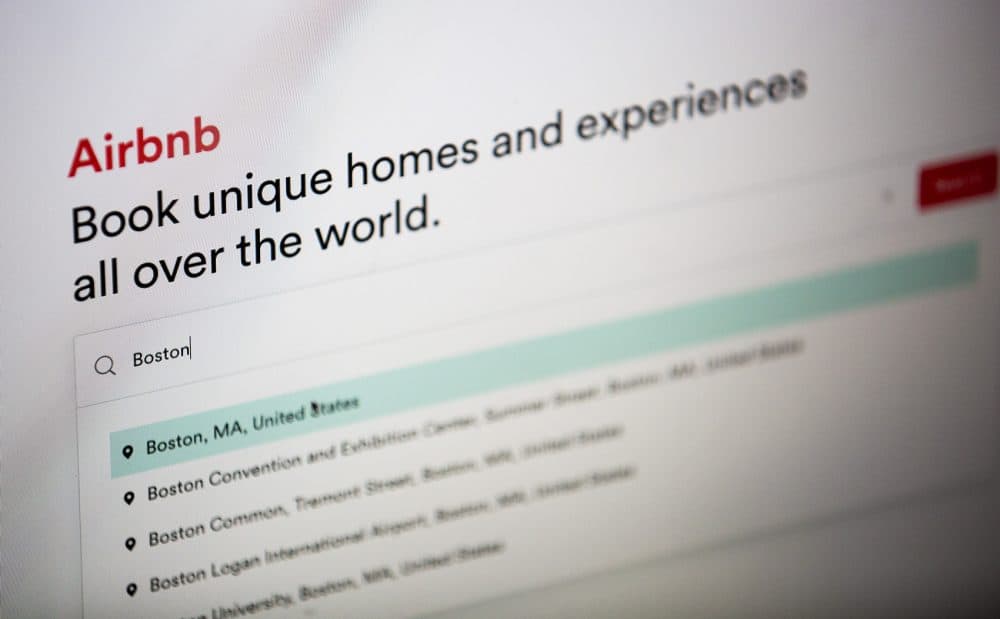Advertisement
Boston City Council Divided Over Proposal To Restrict Short-Term Housing Rentals Like Airbnb
Resume
Boston city councilors are divided over a plan that would regulate short-term housing rentals handled through platforms like Airbnb and HomeAway.
The proposed ordinance, filed by Mayor Marty Walsh earlier this month, takes aim at investors who buy up housing units to use for short-term rentals. It would require people who offer such rentals to prove the unit is their primary address.
The city council raised a number of questions about the proposal Monday. A vote on the measure could happen as early as Wednesday.
Several councilors expressed support for regulating people who purchase "investor units," or housing that is used solely for short-term rentals.
"The best thing we can do is be conservative, be as controlled as possible and make sure we're very clear about where short-term rentals are and limiting them to owner-occupants," Councilor Lydia Edwards said.
Other councilors, however, raised concerns about the impact the proposal might have on such owner-occupants. The plan would place a 120-night cap on short-term rentals in two- and three-family units.
"My goal was to get rid of the investor units but still somehow protect the little person — the owner-occupant — who wanted to earn some extra income for whatever reason," said Councilor Kim Janey. "I worry that that 120[-night] cap puts a hardship on them." She has called for greater flexibility regarding the cap.
Jamaica Plain resident Maria Torella, 52, said the proposed cap would be tough for her family. She has a two-family unit she rents out through HomeAway.
"It saved us from foreclosure," Torella testified during the meeting. "I understand we want to open up housing for more people coming in, but don’t kick out the homeowners who are really struggling to live here."
Some councilors noted their constituents use money they earn through short-term rentals to pay for various expenses, including their mortgages.
Councilor Frank Baker, the harshest critic of the measure, called it too restrictive. He suggested investor units be allowed in some limited capacity and called for no cap on owner-occupied units.
"Everybody's looking for more ways to stay in their homes or to pay for their lives," Baker said, to cheers and applause from people in the packed room. "Why can’t they do what they want to do in their own property?"
Several supporters of the proposal pointed to the negative impact they said short-term rentals have on housing and quality of life.
"I’m saddened to see how much of the housing is changing over to Airbnbs," said Mark Liu, of the Chinese Progressive Association. "We're losing a lot of the heart and character to our neighborhood, seeing longtime residents move out and it’s becoming a tourist neighborhood."
Sheila Dillon, Boston's chief of housing, echoed Liu's sentiments and said the city believes its proposal will help the housing market.
"We don’t want multi-families priced anymore for the short-term rental business," she said. "It’s changing the character of our neighborhoods, and it's making it impossible for people to buy housing stock that we’ve had in this city for hundreds of years."
In a statement, Airbnb said the measure "creates bureaucratic hurdles for homeowners.
"Home sharing rules should be simple and fair for all Bostonians, and we look forward to continued work in that direction," Will Burns, public policy director for Airbnb in Massachusetts, said in a statement.
A few councilors wanted to know more about the data the city has on the impact of short-term rentals. They asked about the city's capacity to enforce the proposed rules. There were concerns that Jan. 1, when the proposal would go into effect, might be too soon for owners to change the status of their property — especially given that most Boston leases start on Sept. 1.
Edwards submitted amendments to the plan that include making a short-term rental registry public, and barring units with an eviction within the last 12 months from hosting short-term rentals.
"The steps that we're taking in this proposal is we're eliminating an industry that employs a lot of people," said Michael Flaherty, city councilor at-large and government operations committee chair, "... and you weigh that up against the quality of life in our neighborhoods."
This segment aired on May 22, 2018.
